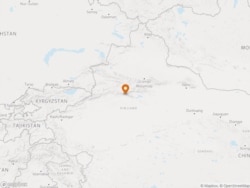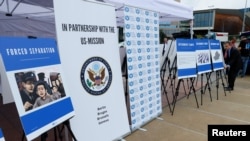China’s human rights record is the focus of a major upcoming United Nations human rights assessment.
The U.N.’s top human rights official said Monday her office is finalizing a report on the allegation of “serious human rights violations” in China’s northwest region of Xinjiang, after China released its National Human Rights Action Plan of China (2021-25) on Sept. 9.
“I regret that I am not able to report progress on my efforts to seek meaningful access to the Xinjiang Uyghur Autonomous Region,” said Michelle Bachelet, United Nations High Commissioner for Human Rights.
At the opening of the U.N. Human Rights Council, Bachelet said her office is finalizing its review of available information on the human rights allegations and plans on making it public.
The update is timely and significant, according to Zumretay Arkin, program and advocacy manager at Munich-based World Uyghur Congress, as it coincides with the three-year anniversary of the high commissioner officially requesting access to the region.
“This report will be the first from the high commissioner's office, but it will only be an additional assessment to the existing reports from U.N. special procedures, and treaty bodies,” Arkin told VOA Mandarin.
According to Marta Hurtado, a spokesperson for the U.N. Office of the High Commissioner for Human Rights (OHCHR), several U.N. authorities have assessed the human rights situation in Xinjiang since 2018. These include the Committee on the Elimination of Racial Discrimination and various human rights experts attached to the U.N. Human Rights Council.
Those independent bodies raised concerns regarding the human rights situation in Xinjiang, where Human Rights Watch and Amnesty International allege Beijing is committing crimes against humanity by arbitrarily detaining more than 1 million Uyghurs and other Muslim ethnic minorities in internment camps and coercing others into forced labor while controlling the rest of the Uyghur community by monitoring them in an increasingly pervasive and onerous way.
Beijing denies the allegations and says what human rights groups describe as internment camps are actually vocational training centers where people from minority groups who lack language and career skills get educational help. China insists that people in Xinjiang are free to choose their work.
Hurtado told VOA the last visit by a U.N. High Commissioner to China was in 2005. She said OHCHR had unsuccessfully asked Beijing for unlimited access to Xinjiang for a team to conduct an assessment of the treatment of Uyghurs in 2018.
“OHCHR has said it would like a team to spend several days on the ground, meet with relevant officials and stakeholders and have the maximum possible access to different institutions and facilities,” Hutardo said. “This has not so far been granted on the terms requested by the office.”
In March, Chinese foreign ministry spokesperson Wang Wenbin told the press in Beijing that the U.N. High Commissioner for Human Rights has succumbed to political pressure and launched unfounded and disinformation-based accusations against China.

“We welcome the U.N. High Commissioner for Human Rights to visit Xinjiang, and the two sides are in communication on this,” Wang said. “But the purpose of the visit should be to promote exchanges and cooperation, not to carry out some kind of ‘investigation’ with China already being presumed as ‘guilty.’ We firmly oppose political manipulation of such issues to strong-arm China.”
“This assessment is a first step toward the U.N. monitoring and reporting that the international community needs, and which many states -- as well as a more than 300-plus coalition of global civil society groups -- have called for,” said Sarah Brooks, program director at International Service for Human Rights (ISHR).
Brooks said this kind of report helps to cut through arguments of “politicization” and present the objective facts, providing a basis for governments and other stakeholders, including businesses, to step up action.
“[I]t would mark the first meaningful assessment undertaken by Bachelet's office - in other words, a U.N. institution, as opposed to [for example] a U.N.-appointed but independent special rapporteur,” Brooks said. “It would demonstrate any gaps between China's legal obligations, and the practices that the U.N. has been able to verify; and it would be a trampoline for more robust monitoring, reporting and evidence gathering in the future.”
U.N. special rapporteurs, independent experts and staff have visited China: In 2013 regarding discrimination against women; 2015 on foreign debt; 2017 about extreme poverty; and in 2019 regarding older persons.
“However, none of these visits included the Uyghur region,” said Brooks. “The independent experts who are tasked with assessing truly sticky issues — such as arbitrary detention, enforced disappearance, torture, minority rights, freedom of religion, opinion, expression — have been rebuffed again and again.”
According to Peter Irwin, senior program officer for advocacy and communications at the Washington-based Uyghur Human Rights Project, China's policy has been to delay, as much as possible, and hinder the ability of the U.N. human rights office to conduct research.
“If China doesn't want to provide access, it's up to the U.N. to work with the mountains of research and testimony available abroad and come up with their own independent conclusions,” Irwin told VOA.




